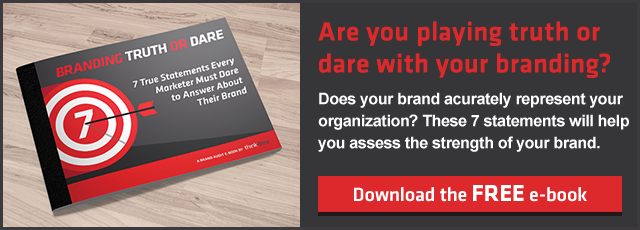
image credit: Rawpixel.com/shutterstock.com
We’re nearing the end of the summer months, and it’s around the time most marketing companies are beginning to plan ahead for next year’s goals. Your company may even have its own objectives and strategies on the drawing boards already. However, alongside your marketing efforts—such as generating more leads or developing a new content calendar—there is one key aspect of your company that must shine through: your brand! In this branding guide, we’ll give you five questions that you should be asking yourself about your company’s current brand.
1. Who is your brand’s target audience?
There’s a difference between those who know about your brand and those whom you are actually targeting. Your audience can come from a variety of different channels such as social media. In fact, social media may be one of the best places for your company to share its brand online and engage with customers and prospects. There’s a bit of a stereotype that b2b businesses are less customer-relationship-focused, but this is far from the truth.
To understand your current audience, you’ll need to get an idea of their pain points, what industry they’re in, and the type of content/media they react the most to. It’s one thing to have a brand, but it’s a totally different ballpark to share messaging effectively. Your company should be looking to address these questions:
- What industry is generating the most brand awareness for your company? What industry does your company want to focus on?
- How does your brand compare to competitors (in terms of the services and solutions that it offers)?
- What do you want people to think of when they picture your brand?
- Does your company regularly share brand insights with its audience?
- Have members of your audience given feedback on your brand? Have they left positive reviews or provided constructive criticism?
2. Does your company’s brand have a personality?
Much like the people you interact with on a daily basis, a brand often has a key personality or characteristic. A brand’s personality helps it build credibility and cultivate brand loyalty. After all, no one wants to interact with a brand that’s too “in-your-face” or aggressive. If you were to explain how your brand makes someone feel, what personality traits would you use to describe it? Think of your brand as a persona, not unlike the buyer personas you’re company is targeting in the first place. It can help to reflect on people in your everyday life who inspire you. With that in mind, here are some personas that may sound a bit familiar!
- The wise grandparent: your brand knows the ins and outs of actionable marketing solutions, unlike any other company. You’ve established thought leadership and credibility, so much so to the point where people look to your brand prior to any additional research.
- The relatable older sibling: your brand isn’t as concerned with statistics and big-number data when creating solutions. Your focus is much more on acting as a role model and teaching important lessons through past experience. You’ve lived through your audience’s pain points, and now you’re ready to pass down your knowledge.
- The fun aunt or uncle: your brand is all about positivity and making others feel accomplished and satisfied. You’re likely spending a lot of time cultivating brand loyalty by sharing relevant content, posting on social media, and keeping your audience informed—all with an optimistic tone.
3. What is the story behind your brand?
Some companies focus too much on what their brand does and not enough on how and why it does it—but odds are, there’s a story behind your brand. This doesn’t mean every brand will have complex, decade-spanning history; it’s not always about what happened in the past that got your brand to where it is today. Focusing on the "how" and "why" provides for a more compelling and emotional story behind your brand.
Think of your brand as a hero (or at the very least, certainly not a villain!) in a story—how has your brand helped to enrich the lives of others? What drives your brand to search for solutions to the biggest industry challenges? Remember, you don’t always need technical terminology to get your point across with your brand.
In fact, too much data and statistics—such as, “our company has grown X amount of agencies by X amount in a span of X months—can come off as bragging more than encouraging. That’s not to say you shouldn’t include some of these statistics on your company website, but keep your brand story as more personal and emotional.
4. Does your brand have a specific area of focus?
Let’s take branding to an even more relatable level. When taking a multiple-choice exam, the option “all of the above” almost instinctively feels like the correct answer. We’ve all been there before. Well, the same can’t be said about your brand; if you try to do too much with your brand, it ends up feeling like it has no real specialty or expertise.
It might sound interesting to be a jack-of-all-trades, but as the saying goes, you’ll only end up being a master of none. If your marketing company offers a variety of services, you’ll want to narrow down your brand messaging so you focus on the key features first. For example, your company may have a greater focus on social media marketing or specifically on content development and distribution.
You’ll always have additional talents that your brand can offer, but it’s overwhelming—and a little unrealistic—to expect to capitalize on all of them in your brand messaging. We like to use Google as an example of a brand that has multiple services to offer but is universally known for its search engine. With Google, you have access to Gmail, google analytics, and so many more features—but its most well-known brand value comes from its search capabilities.
5. When was the last time your brand updated its logo or tagline?
A logo is usually the first asset that most will think of when asked about a brand. It’s the image that immediately pops into your head when you hear a company name like “Apple” or “Coke.” As these brands have shown us before, you don’t need a complicated design to stand out—and you certainly don’t need to stick with the same style you’ve had decades ago.
Your brand logo can be simple enough to speak to your target audience—all the while, remaining memorable enough to show what sets your brand apart from others. This also applies to your brand messaging and brand tagline. As previously mentioned, your brand can’t be a jack-of-all-trades and expect to be the top solution in each one.
When reevaluating your brand message, consider how you will share it with your audience. For someone to truly engage with your brand messaging, you have to show them what your brand is about—and you don’t need a tagline to do so. Using videos, images, and GIFs are a strong alternative to simply coming up with a single line of text about your brand. The brands that leave a lasting impact are the ones that feel fresh and truly capture your company’s personality and tone.
If your marketing company has had any difficulty answering these questions, you may be ready for a brand assessment or refresh. Luckily, thinkdm2 has you covered! Thinkdm2 is a digital marketing and branding agency from New Jersey that specializes in brand and website development for technology companies. To discuss your marketing, branding, and web design needs, contact us today at (201)-840-8910.



